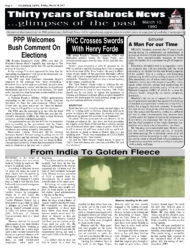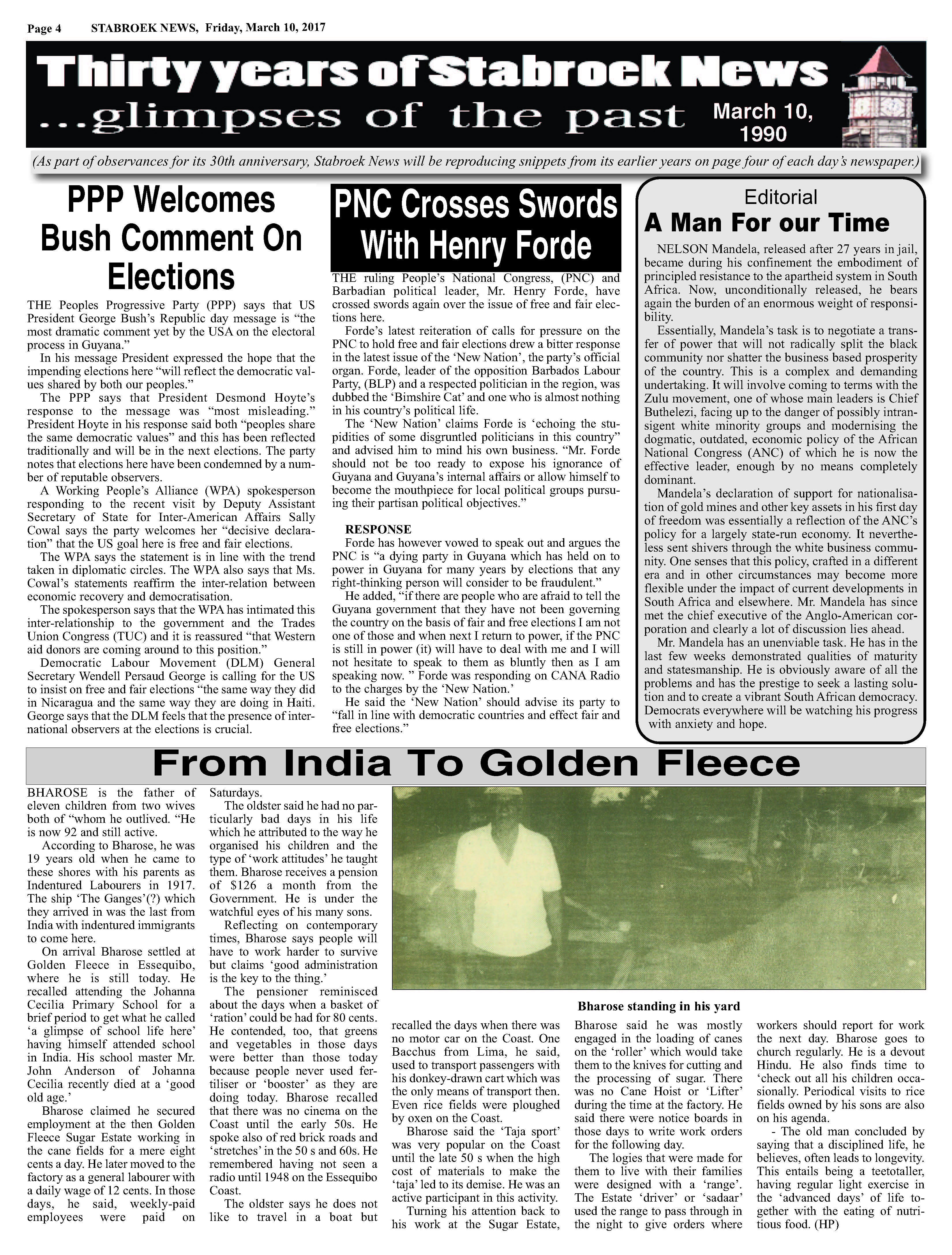THE Peoples Progressive Party (PPP) says that US President George Bush’s Republic day message is “the most dramatic comment yet by the USA on the electoral process in Guyana.”
In his message President expressed the hope that the impending elections here “will reflect the democratic values shared by both our peoples.”
The PPP says that President Desmond Hoyte’s response to the message was “most misleading.” President Hoyte in his response said both “peoples share the same democratic values” and this has been reflected traditionally and will be in the next elections. The party notes that elections here have been condemned by a number of reputable observers.
A Working People’s Alliance (WPA) spokesperson responding to the recent visit by Deputy Assistant Secretary of State for Inter-American Affairs Sally Cowal says the party welcomes her “decisive declaration” that the US goal here is free and fair elections.
The WPA says the statement is in line with the trend taken in diplomatic circles. The WPA also says that Ms. Cowal’s statements reaffirm the interrelation between economic recovery and democratisation.
The spokesperson says that the WPA has intimated this inter-relationship to the government and the Trades Union Congress (TUC) and it is reassured “that Western aid donors are coming around to this position.”
Democratic Labour Movement (DLM) General Secretary Wendell Persaud George is calling for the US to insist on free and fair elections “the same way they did in Nicaragua and the same way they are doing in Haiti. George says that the DLM feels that the presence of international observers at the elections is crucial.
PNC Crosses Swords With Henry Forde

Forde’s latest reiteration of calls for pressure on the PNC to hold free and fair elections drew a bitter response in the latest issue of the ‘New Nation’, the party’s official organ. Forde, leader of the opposition Barbados Labour Party, (BLP) and a respected politician in the region, was dubbed the ‘Bimshire Cat’ and one who is almost nothing in his country’s political life.
The ‘New Nation’ claims Forde is ‘echoing the stupidities of some disgruntled politicians in this country” and advised him to mind his own business. “Mr. Forde should not be too ready to expose his ignorance of Guyana and Guyana’s internal affairs or allow himself to become the mouthpiece for local political groups pursuing their partisan political objectives.”
RESPONSE
Forde has however vowed to speak out and argues the PNC is “a dying party in Guyana which has held on to power in Guyana for many years by elections that any right-thinking person will consider to be fraudulent.”
He added, “if there are people who are afraid to tell the Guyana government that they have not been governing the country on the basis of fair and free elections I am not one of those and when next I return to power, if the PNC is still in power (it) will have to deal with me and I will not hesitate to speak to them as bluntly then as I am speaking now. ” Forde was responding on CANA Radio to the charges by the ‘New Nation.’
He said the ‘New Nation’ should advise its party to “fall in line with democratic countries and effect fair and free elections.”
Editorial
A Man For our Time
NELSON Mandela, released after 27 years in jail, became during his confinement the embodiment of principled resistance to the apartheid system in South Africa. Now, unconditionally released, he bears again the burden of an enormous weight of responsibility.
Essentially, Mandela’s task is to negotiate a transfer of power that will not radically split the black community nor shatter the business based prosperity of the country. This is a complex and demanding undertaking. It will involve coming to terms with the Zulu movement, one of whose main leaders is Chief Buthelezi, facing up to the danger of possibly intransigent white minority groups and modernising the dogmatic, outdated, economic policy of the African National Congress (ANC) of which he is now the effective leader, enough by no means completely dominant.
Mandela’s declaration of support for nationalisation of gold mines and other key assets in his first day of freedom was essentially a reflection of the ANC’s policy for a largely state-run economy. It nevertheless sent shivers through the white business community. One senses that this policy, crafted in a different era and in other circumstances may become more flexible under the impact of current developments in South Africa and elsewhere. Mr. Mandela has since met the chief executive of the Anglo-American corporation and clearly a lot of discussion lies ahead.
Mr. Mandela has an unenviable task. He has in the last few weeks demonstrated qualities of maturity and statesmanship. He is obviously aware of all the problems and has the prestige to seek a lasting solution and to create a vibrant South African democracy. Democrats everywhere will be watching his progress with anxiety and hope.
From India To Golden Fleece
BHAROSE is the father of eleven children from two wives both of “whom he outlived. “He is now 92 and still active.
According to Bharose, he was 19 years old when he came to these shores with his parents as Indentured Labourers in 1917. The ship ‘The Ganges’(?) which they arrived in was the last from India with indentured immigrants to come here.
On arrival Bharose settled at Golden Fleece in Essequibo, where he is still today. He recalled attending the Johanna Cecilia Primary School for a brief period to get what he called ‘a glimpse of school life here’ having himself attended school in India. His school master Mr. John Anderson of Johanna Cecilia recently died at a ‘good old age.’
Bharose claimed he secured employment at the then Golden Fleece Sugar Estate working in the cane fields for a mere eight cents a day. He later moved to the factory as a general labourer with a daily wage of 12 cents. In those days, he said, weekly-paid employees were paid on Saturdays.
The oldster said he had no particularly bad days in his life which he attributed to the way he organised his children and the type of ‘work attitudes’ he taught them. Bharose receives a pension of $126 a month from the Government. He is under the watchful eyes of his many sons.
Reflecting on contemporary times, Bharose says people will have to work harder to survive but claims ‘good administration is the key to the thing.’
The pensioner reminisced about the days when a basket of ‘ration’ could be had for 80 cents. He contended, too, that greens and vegetables in those days were better than those today because people never used fertiliser or ‘booster’ as they are doing today. Bharose recalled that there was no cinema on the Coast until the early 50s. He spoke also of red brick roads and ‘stretches’ in the 50 s and 60s. He remembered having not seen a radio until 1948 on the Essequibo Coast.
The oldster says he does not like to travel in a boat but recalled the days when there was no motor car on the Coast. One Bacchus from Lima, he said, used to transport passengers with his donkey-drawn cart which was the only means of transport then. Even rice fields were ploughed by oxen on the Coast.
Bharose said the ‘Taja sport’ was very popular on the Coast until the late 50 s when the high cost of materials to make the ‘taja’ led to its demise. He was an active participant in this activity.
Turning his attention back to his work at the Sugar Estate, Bharose said he was mostly engaged in the loading of canes on the ‘roller’ which would take them to the knives for cutting and the processing of sugar. There was no Cane Hoist or ‘Lifter’ during the time at the factory. He said there were notice boards in those days to write work orders for the following day.
The logies that were made for them to live with their families were designed with a ‘range’. The Estate ‘driver’ or ‘sadaar’ used the range to pass through in the night to give orders where workers should report for work the next day. Bharose goes to church regularly. He is a devout Hindu. He also finds time to ‘check out all his children occasionally. Periodical visits to rice fields owned by his sons are also on his agenda.
The old man concluded by saying that a disciplined life, he believes, often leads to longevity. This entails being a teetotaller, having regular light exercise in the ‘advanced days’ of life together with the eating of nutritious food. (HP)

